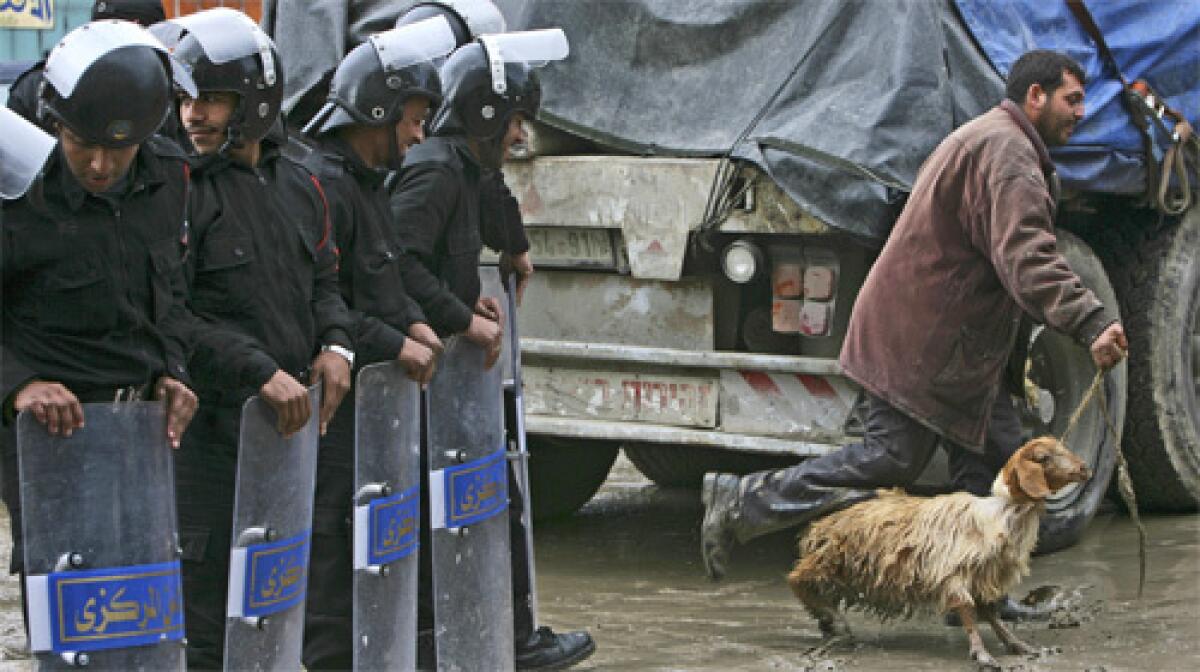Gazans’ influx raises Sinai’s prices

- Share via
EL ARISH, EGYPT — When the visitors flooded into town a week ago, taxi fares soared and Shaima Hassan had to walk an hour to get to work. She was one of many Egyptians who welcomed her “Palestinian brothers” from the nearby Gaza Strip, but now she just wants them to go home.
“The first few days of their arrival, things were hard. Prices increased enormously -- by more than 50% -- especially prices of cigarettes and other basic commodities,” said Hassan, a plumber in this town about 25 miles southwest of the border. “Taxi drivers seized the opportunity to raise fares. Palestinians were giving them 20 Egyptian pounds [$3.60] for a ride that used to cost us 25 piasters [4 1/2 cents].”
More than 500,000 Palestinians have flooded through breaches in the border over the last week for a buying spree that has stunned the Bedouins, laborers and civil servants in the poor towns dotting Egypt’s Sinai. Shopkeepers, cabdrivers and even clever shepherds, who acted as guides, raised prices beyond the reach of their Egyptian customers.
Government authorities responded by shutting down stores and shops. Police tightened roadblocks, and the message was out: The party’s over, or at least winding down.
On Tuesday, droves of Palestinians shopped on the Egyptian side of Rafah, a shared border town. But the deluge in the rest of the Sinai had significantly diminished. Officials here said that 4,000 to 5,000 Palestinians remained in the Sinai, including hundreds who lingered around El Arish. Some of the Gazans here said they would try to sneak across to Cairo, about 170 miles farther southwest.
The North Sinai region’s governor, Gen. Ahmed Abdel Hamid, said local banks had exchanged nearly $100 million into Egyptian pounds for Palestinians in the last week. He estimated that the visitors had spent the equivalent of $40 million on “food, rice, sugar, meat, cattle, sheep, cement, bikes, fuel -- they took everything that was there in the stores.”
There were crooks amid the shoppers too.
“We did not want to instigate any problem, so whoever was arrested was just asked to return back what he stole,” the governor said.
Barea Ismail teaches school and runs a store in El Arish. The Palestinians “were here like large troupes; we could not even see the pavement as they walked into town,” he said. “Their presence in large numbers made me feel unsafe. Imagine if they get into an argument with anyone here; they would all come together against him.
“Closing stores down was a good idea,” he said.
Militants of Hamas, the Islamic group that controls Gaza, worked for a second day Tuesday with Egyptian police to restrict traffic at the Rafah crossing but thwarted efforts to close it entirely. The crisis began when masked Palestinian gunmen blew holes in the border wall days after Israel had blocked fuel and other goods from reaching the enclave.
“What the [Egyptian] government did when it let the Palestinians in was right because it lifted the siege that was imposed on the Gazans,” said Ihab Ghoul, an accountant. “We were happy to have them here, especially because half of the Gazans have kin relations with us. As to prices, it was the dealers who raised the prices, not the Palestinians.
“There was no control from the police over the situation,” he said. “Many illegal goods were circulated. . . . Drugs became widely available.”
Ammar Mohammed, a Palestinian baker who was kicked out of an El Arish seaside resort by police, said he was ready to leave Egypt.
“We spent one day in the street and another at one of our relatives’ here,” he said. “We are planning to go home because we can never give up our country, but we just wanted to relax for a while here. We came out of a drastic situation there.”
jeffrey.fleishman
@latimes.com
El-Hennawy reported from El Arish and Fleishman from Cairo.
More to Read
Sign up for Essential California
The most important California stories and recommendations in your inbox every morning.
You may occasionally receive promotional content from the Los Angeles Times.











